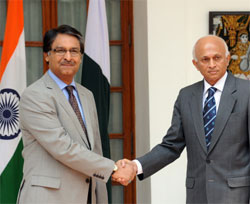
New Delhi, July 5: India has conveyed to Pakistan the outcome of the investigations into the 2008 Mumbai terror attack and looks forward to them taking action on the information, Indian Foreign Secretary Ranjan Mathai said here Thursday on day two of his talks with his Pakistani counterpart Jalil Abbas Jilani.
Mathai said Indian Home Minister P. Chidambaram has spoken of the "scale of conspiracy and extent of control (of players in Pakistan)" in the attacks.
"We did convey on the outcome of the probe and we look forward to them taking action on the information," Mathai said at a joint presser with Jilani.
The talks that began Wednesday were held in the backdrop of the interrogation of 26/11 plotter Abu Jindal Hamza and his confession that the terror attack on Mumbai was controlled from Pakistan.
India Wednesday did not hand over a dossier on Abu Jindal to Pakistan at the talks as it was felt that doing so at this stage will hinder the probe.
Jindal was arrested June 21 at the Delhi airport after he was deported from Saudi Arabia. He has confessed to being in the control room in Karachi directing the 10 terrorists who launched their carnage in Mumbai, killing 166 people and injuring 238 people.





Comments
Add new comment